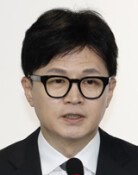U.S. acquiesces in Japans move to revise peace constitution
U.S. acquiesces in Japans move to revise peace constitution
Posted May. 04, 2013 03:22,
The U.S. government has virtually taken an acquiescent position in Japanese Prime Minister Shinzo Abes move to revise Japans pacifist constitution. Japans major political parties announced public statements on the occasion of the Constitution Memorial Day on Friday and began in earnest to discuss a constitutional revision based on a draft announced in April 2012 by the Liberal Democratic Party, the current ruling party.
Asked about Japans move to revise its constitution, U.S. State Department deputy spokesman Patrick Ventrell told a regular news briefing Thursday, Well, I really refer you to the Japanese for anything about their constitution...Thats a matter for the Japanese, internally, to look at. He suggested that Washington is considering the issue as Japans domestic matter.
Youve heard the President, youve heard the Secretary talk about our cornerstone alliance with the Japanese and how important it is, and so thats true going forward, the spokesman said. It was the first time that the U.S expressed an official opinion on Japans planned constitutional revision.
It was the United States that, through the postwar General Headquarters, drafted Japans current pacifist constitution in 1946 that forced Tokyo to renounce war and the possession of a military. However, the U.S. acquiescence in Japans move to revise its constitution implies Washingtons demand that Japans Self-Defense Forces fill the U.S. militarys vacuum in East Asia caused by U.S. fiscal difficulties.
Since the 1991 Gulf War, Washington has demanded that Japan expand the roles of the Self-Defense Forces. During the Gulf War, Japan rejected a U.S. request to send troops, citing the pacifist constitution. Although Japan instead offered a huge amount of money to the tune of 13 billion U.S. dollars, the U.S. excluded Japan from the list of war victors. When the U.S. attacked Afghanistan in 2001 and carried out the restoration work in Iraq in 2003, it strongly demanded that Japan send the Self-Defense Forces.
However, the Japanese ruling party`s draft is similar to the pre-war constitution of the Empire of Japan in that it defines the Japanese emperor as the embodiment of all sovereign power and Japanese peoples rights as endowed by the emperor. The draft also calls for defining the emperor as Japans head of state and requiring its citizens to respect the Japanese national flag and anthem. In particular, the draft removes a clause in Article 9 on the renunciation of war, calls for the establishment of a military and obligates citizens to cooperate in national defense, making legal grounds for adopting a military conscription system.
Japans right-wing forces have shown their determination to lay a cornerstone for Japans return to the strong Japan before the Second World War at this opportunity. Many Japanese media outlets, including the Asahi Shimbun, criticize the move for going against the fundamental spirit of the constitution that is aimed at controlling state power.
bae2150@donga.com







